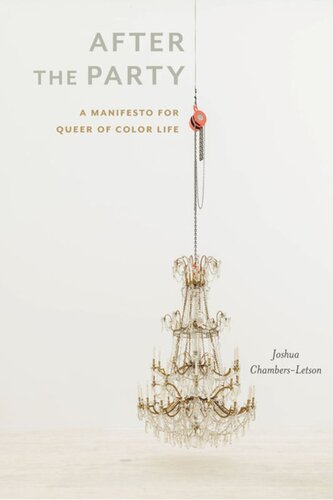

Most ebook files are in PDF format, so you can easily read them using various software such as Foxit Reader or directly on the Google Chrome browser.
Some ebook files are released by publishers in other formats such as .awz, .mobi, .epub, .fb2, etc. You may need to install specific software to read these formats on mobile/PC, such as Calibre.
Please read the tutorial at this link: https://ebookbell.com/faq
We offer FREE conversion to the popular formats you request; however, this may take some time. Therefore, right after payment, please email us, and we will try to provide the service as quickly as possible.
For some exceptional file formats or broken links (if any), please refrain from opening any disputes. Instead, email us first, and we will try to assist within a maximum of 6 hours.
EbookBell Team

4.7
66 reviewsWinner, 2019 ATHE Outstanding Book Award, given by the Association for Theatre in Higher Education
A new manifesto for performance studies on the art of queer of color worldmaking.
After the Party tells the stories of minoritarian artists who mobilize performance to produce freedom and sustain life in the face of subordination, exploitation, and annihilation. Through the exemplary work of Nina Simone, Jorge Ignacio Cortiñas, Danh Vō, Felix Gonzalez-Torres, Eiko, and Tseng Kwong Chi, and with additional appearances by Nao Bustamante, Audre Lorde, Martin Wong, Assata Shakur, and Nona Faustine, After the Party considers performance as it is produced within and against overlapping histories of US colonialism, white supremacy, and heteropatriarchy. Building upon the thought of José Esteban Muñoz alongside prominent scholarship in queer of color critique, black studies, and Marxist aesthetic criticism, Joshua Chambers-Letson maps a portrait of performance’s capacity to produce what he calls a communism of incommensurability, a practice of being together in difference.
Describing performance as a rehearsal for new ways of living together, After the Party moves between slavery, the Civil Rights Movement, the first wave of the AIDS crisis, the Vietnam War, and the catastrophe-riddled horizon of the early twenty-first century to consider this worldmaking practice as it is born of the tension between freedom and its negation. With urgency and pathos, Chambers-Letson argues that it is through minoritarian performance that we keep our dead alive and with us as we struggle to survive an increasingly precarious present.